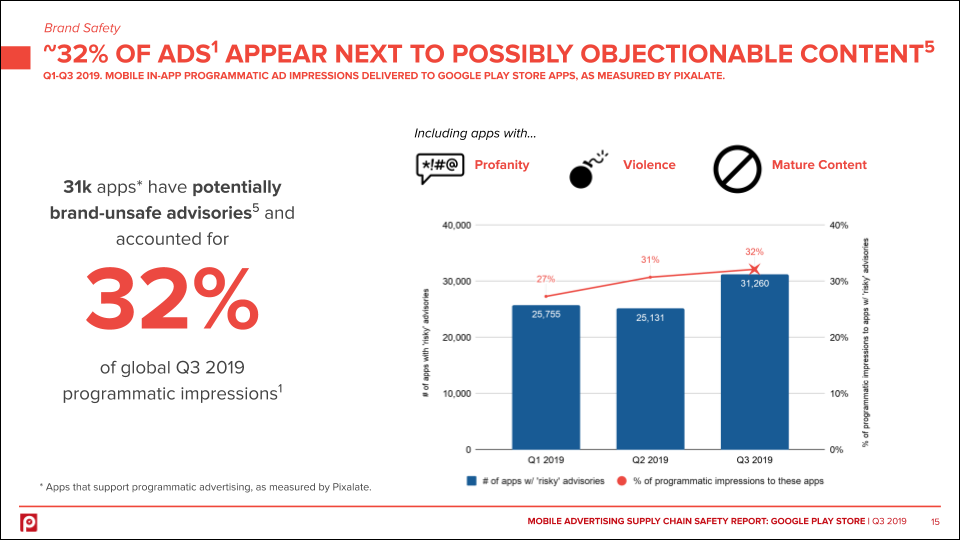
Pixalate's 2019 Mobile Advertising Supply Chain Safety Report dives into brand safety for mobile in-app programmatic advertising on the Google Play Store.
The results reveal that a significant amount of programmatic mobile in-app ad transactions are possibly-brand unsafe.
In Q1 2019, about 26,000 Google Play Store apps had possibly brand-unsafe advisories. By Q3, that number had risen to over 31,000.
Possibly "brand-unsafe" or "objectionable" advisories are based on content ratings used by the Google Play Store as well as other brand safety categories found through a content analysis of the app by Pixalate (i.e. adult/sexual content, gambling, violence, drugs, alcohol, profanity, or unrestricted web access).
According to Pixalate's research, the 31,000 Google Play Store apps with possibly brand-unsafe advisories received about 32% of all mobile in-app Android programmatic ad transactions in Q3 2019.
This means that nearly one-third of all programmatic mobile app ads targeting Android users in Q3 2019 were potentially brand-unsafe, the highest mark in 2019.
Download a free copy of the 2019 Mobile Advertising Supply Chain Safety Report to learn more.
Disclaimer
The content of this blog reflects Pixalate's opinions with respect to the factors that Pixalate believes can be useful to the digital media industry. Any proprietary data shared is grounded in Pixalate's proprietary technology and analytics, which Pixalate is continuously evaluating and updating. Any references to outside sources should not be construed as endorsements. Pixalate's opinions are just that, opinions, which means that they are neither facts nor guarantees.
*By entering your email address and clicking Subscribe, you are agreeing to our Terms of Use and Privacy Policy.
These Stories on Mobile
*By entering your email address and clicking Subscribe, you are agreeing to our Terms of Use and Privacy Policy.

Disclaimer: The content of this page reflects Pixalate’s opinions with respect to the factors that Pixalate believes can be useful to the digital media industry. Any proprietary data shared is grounded in Pixalate’s proprietary technology and analytics, which Pixalate is continuously evaluating and updating. Any references to outside sources should not be construed as endorsements. Pixalate’s opinions are just that - opinion, not facts or guarantees.
Per the MRC, “'Fraud' is not intended to represent fraud as defined in various laws, statutes and ordinances or as conventionally used in U.S. Court or other legal proceedings, but rather a custom definition strictly for advertising measurement purposes. Also per the MRC, “‘Invalid Traffic’ is defined generally as traffic that does not meet certain ad serving quality or completeness criteria, or otherwise does not represent legitimate ad traffic that should be included in measurement counts. Among the reasons why ad traffic may be deemed invalid is it is a result of non-human traffic (spiders, bots, etc.), or activity designed to produce fraudulent traffic.”

